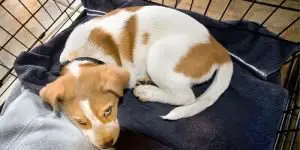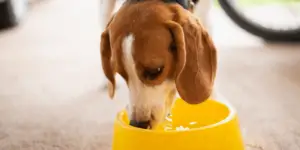
How often do puppies poop?
- Written by Dr. Cristina Vulpe
- Last updated
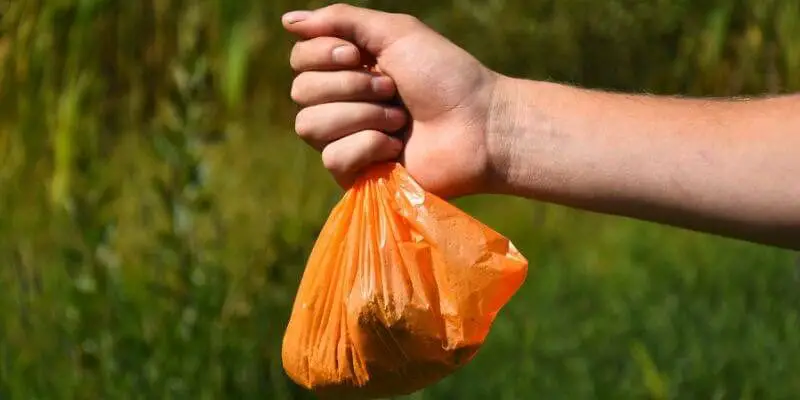
Key takeaways
- It depends on your dog’s age. It’s more or less normal for young puppies to poop as often as once every 3-4 hours. 1-year-olds should be able to poop twice a day.
- The poop frequency and amount is influenced by many factors. If your dog recently had a diet change or suffered from indigestion, they could poop less or more.
- Diseases can cause diarrhea. Gastroenteritis can be a result of bacterial or viral diseases or just severe parasite infestations.
- If your puppy doesn’t drink enough water, they could become constipated. Constipation is a serious issue. Impacted dogs can lose their life in a few days.
- Fiber influences frequency and quantity. Try to opt for high-fiber puppy diets or add a bit of pumpkin or sweet potatoes to your dog’s main meals.
In this article
Is there an average amount a puppy should be pooping per day?
The answer to this question is that it largely depends on several factors, out of which the puppy’s age is the most important one.
The quantity per se depends on however much the dog has had to eat over the course of a day, whether they have suffered from constipation over the past few days or so, or if they have received a large amount of fiber all of a sudden.
In terms of frequency, very young puppies can poop once an hour or two hours, especially if they have eaten something that does not agree with their digestive system. In general, though, dogs should never poop more often than 6-7 times a day regardless of their age.
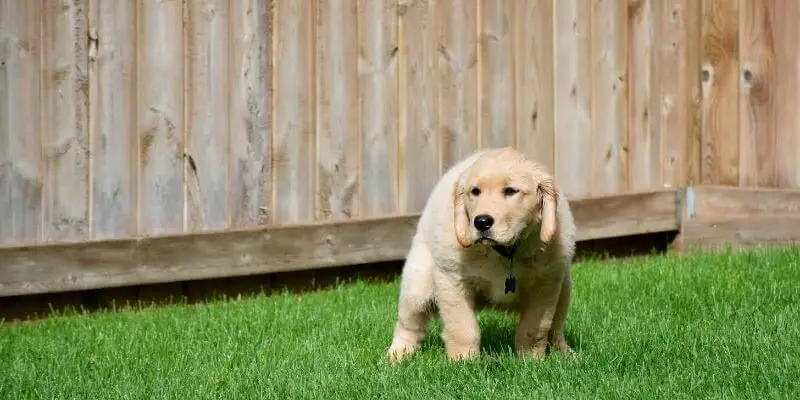
Puppy pooping at 8 weeks
As your puppy grows and gets a bit older, they will become more capable of controlling their instincts. They aren’t going to pee and poop as much and for reasons such as getting all enthusiastic when you come back home from work, but the frequency will decrease.
At 8 weeks, it’s normal for a puppy to poop between 4 and 5 times a day, every single day.
Puppy pooping at 12 weeks
By the time your pet reaches the age of three whole months, they will start having a bit more control over their peeing and pooping instincts. As such, they will only defecate 4 times in a day, and on occasion just 3 times.
Puppy pooping at 5 months onwards
At 5 months or 6 months, your puppy should be able to have to go potty only three times a day. Consequently, you will be able to create a schedule where you take your dog out for walks in the morning, at midday, and in the evening.
What if your puppy isn’t pooping a lot?
Your puppy is supposed to have regular bowel movements every single day. If you see any sudden decrease in terms of frequency or quantity of fecal matter, something could be wrong and your dog might be suffering from constipation.
This is not a health issue that should be ignored because if it is not treated as early as possible, it could lead to severe outcomes such as a fecaloma, for example, a very bad complication.
A dog that is impacted can show some of the following symptoms:
- Vomiting
- Diarrhea
- Loss of appetite
- Bloating
- Pain in the abdomen
- Dehydration
- Weakness
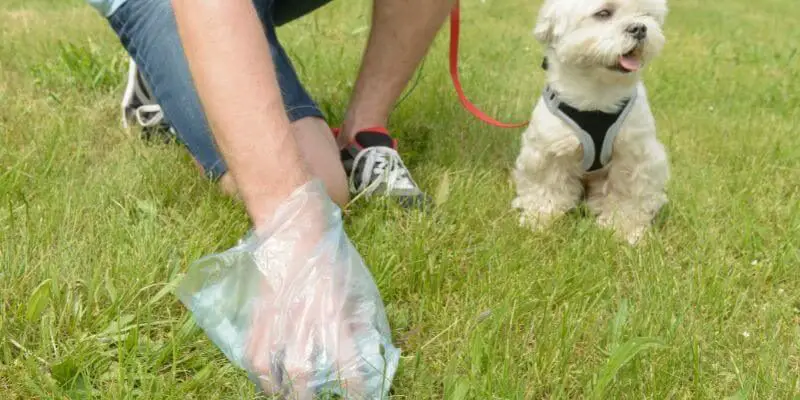
How does dog pooping differ between puppies and adult dogs?
Adult dogs are capable of controlling their instincts much better, especially when compared to their younger counterparts.
That is why most dogs, even those that live in apartment buildings, have a higher resistance that allows them to go potty only when they are taken out for walks – twice a day, in the morning and in the evening.
Puppies aren’t as good when it comes to holding it in, though. They are also much more sensitive to a variety of factors, whether that be diet changes or exposure to various microorganisms (bacteria, viruses, and yeast strains).
Therefore, they have a much higher likelihood (compared to adult dogs) to develop diarrhea or just pass softer stools.
Plus, puppies tend to have intestinal parasites more than adults in the sense that it takes a bit of time for their owners to become informed as to how often they should deworm their pets.
Things That Can Affect How Often Your Puppy Is Pooping
Diet
Regularity is important because failing to pass just one bowel movement can easily lead to constipation – for dogs and other animals, too.
Try to incorporate some types of fiber into your pet’s diet to make sure that they are capable of defecating normally.
These days, the majority of commercial dog diets do come with fiber, but the cheaper varieties might not include the best fiber sources. For example, some have wheat or corn, which are unsuitable for dogs and can give them tummy aches.
By contrast, healthy sources of fiber can be considered pumpkin or sweet potato, along with a piece of apple every now and then (without the seeds, though). Beet pulp, flaxseed, carrots, and even green beans can all influence the amount and frequency.
Illness
If your puppy is sick, no matter the type of disease they have, you might notice changes in their pooping routine. When they have a fever, their digestive system might not have enough moisture to allow them to defecate.
On the other hand, if your dog has a gastrointestinal infection, they could be passing diarrheic stools all the time.
Do consider that anything more than 5-6 stools per day is abnormal and that puppies can quickly lose their life when they become dehydrated.
Stress
If you’ve ever felt nervous before, you probably know that one of the symptoms that anxiety causes in people is abdominal pain. The same can happen to dogs, especially puppies.
When a puppy is taken out of their normal environment and transported to a different place, whether that be a new home, the vet clinic, or even a new park where they don’t know any other dogs or people, they might experience diarrhea or constipation as a result of stress.
Age
As your pet ages, the pooping frequency will decrease. Of course, you can make things easier for both you and your dog by giving your puppy rewards each time they go potty outdoors instead of in their crate, for instance.
If your puppy is 3-months-old, it is normal for them to go potty four times a day. A 6-month-old puppy can poop two to three times a day and an adult (12 months to 18 months depending on the breed) should be able to poop just twice a day.
Water intake
The amount of water that your dog has every single day largely influences their bowel movements. If they do not have enough water, they will risk becoming constipated. This rule applies to humans, too.
A dehydrated dog that doesn’t have an infection cannot pass stools just because there’s no lubrication inside their gut.
On the other hand, if a dog has more than enough water, they will be able to go potty on the regular without necessarily developing diarrhea.
Make sure that your puppy always has access to fresh and clean water so that they actually want to drink some.
If your dog doesn’t seem to be crazy about drinking water, you can give them a bit of warm bone broth instead (in the colder seasons) or ice cubes (in the summer when the weather is hot).
Other than frequency, what else should I look out for with my puppy’s poop?
Shape and consistency
Your puppy’s poop should always look a bit like a log and be somewhat firm, but not too much. You should not see your pet straining to defecate. The process should be straightforward and relatively quick.
Color
When it comes to the color of your puppy’s poop, it should always be something in the lines of chocolate brown.
Of course, variations can exist depending on whatever the dog has had for their recent meals, especially if you made the mistake of feeding them table scraps.
But brown is the color you should be looking for when taking a peek at your pet’s feces.
Smell
Poop smells like poop no matter the species it comes from. However, that does not mean that dogs’ poop should be smellier than that of humans.
The smell should be mild and definitely present, but it should never be pungent to the point that it is extremely strong. Whenever smell changes happen suddenly, you should feel a little alarmed.
Some truly pathogenic bacteria can cause severe gastrointestinal issues in dogs, and some of them can even put your puppy’s life in danger – so weird or pungent poop smells should convince you to seek out veterinary assistance.
When to call your vet
Any time you notice something very different about your dog’s poop, you should take them to the vet. This is particularly important in the first few months of their life, when they are especially vulnerable.
There should be no traces of mucus, blood, or parasite eggs or larvae in your dog’s feces. Strange colors like green, white, or yellow, or the presence of grease in the dog poop are not normal, either.
Watery diarrhea or soft poop should also be an indication that your dog needs to be seen by a veterinary professional.
References
- https://akjournals.com/view/journals/004/69/1/article-p9.xml
- https://www.akc.org/expert-advice/health/dog-constipation/
- https://www.preventivevet.com/dogs/what-dogs-poo-can-tell-you-about-their-health
- https://www.ncbi.nlm.nih.gov/pmc/articles/PMC9031195/
- https://pubmed.ncbi.nlm.nih.gov/19854997/
- https://www.ncbi.nlm.nih.gov/pmc/articles/PMC7151926/
- https://www.ijbs.com/v18p5086.htm

Written by: Dr. Cristina Vulpe
Dr. Cristina Vulpe is a certified veterinarian who graduated in 2011 and earned her PhD in canine oncology in 2015, with a thesis focused on the diagnosis of abdominal tumors in dogs.


